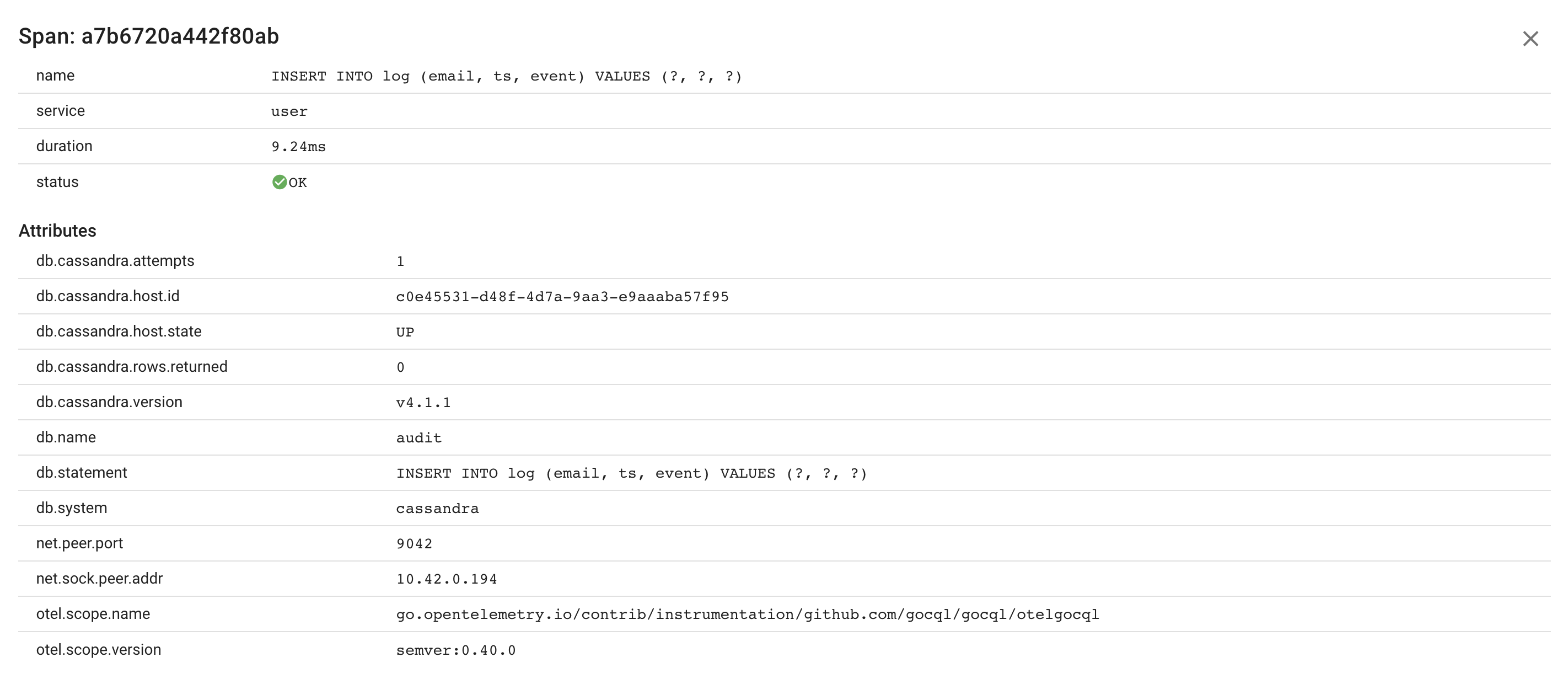OpenTelemetry for Go
Instrumenting a Golang application with OpenTelemetry can provide valuable insights into the application's performance and behavior. OpenTelemetry is an open-source observability framework that enables the collection and exporting of telemetry data. This document covers the steps required to instrument a Golang application with OpenTelemetry.
HTTP server
HTTP server instrumentation involves generating detailed spans that describe the handling of inbound HTTP requests. These spans provide insight into the entire lifecycle of each request, from the moment it arrives at the server to the moment it is sent back to the client.
- Without Request Routers
- Gorilla Mux
- Echo Web Framework
- GIN Web Framework
Step 1: add OpenTelemetry dependencies
$ go get \
go.opentelemetry.io/otel/exporters/otlp/otlptrace/otlptracehttp \
go.opentelemetry.io/contrib/instrumentation/net/http/otelhttp
Step 2: initialize OpenTelemetry and instrument HTTP handlers
The following example demonstrates how to instrument an HTTP handler with OpenTelemetry and export traces to an OpenTelemetry Collector through HTTP. The collector's endpoint and service name can be configured using environment variables.
package main
import (
"context"
"fmt"
"go.opentelemetry.io/contrib/instrumentation/net/http/otelhttp"
"go.opentelemetry.io/otel"
"go.opentelemetry.io/otel/exporters/otlp/otlptrace"
"go.opentelemetry.io/otel/exporters/otlp/otlptrace/otlptracehttp"
"go.opentelemetry.io/otel/propagation"
"go.opentelemetry.io/otel/sdk/resource"
sdktrace "go.opentelemetry.io/otel/sdk/trace"
"log"
"net/http"
)
func initTracer() {
ctx := context.Background()
client := otlptracehttp.NewClient()
exporter, err := otlptrace.New(ctx, client)
if err != nil {
log.Fatalf("failed to initialize exporter: %e", err)
}
res, err := resource.New(ctx)
if err != nil {
log.Fatalf("failed to initialize resource: %e", err)
}
// Create the trace provider
tp := sdktrace.NewTracerProvider(
sdktrace.WithBatcher(exporter),
sdktrace.WithResource(res),
)
// Set the global trace provider
otel.SetTracerProvider(tp)
// Set the propagator
propagator := propagation.NewCompositeTextMapPropagator(propagation.TraceContext{}, propagation.Baggage{})
otel.SetTextMapPropagator(propagator)
}
func helloHandler(w http.ResponseWriter, r *http.Request) {
fmt.Fprintf(w, "Hello, World!")
}
func main() {
// Initialize the HTTP server with instrumentation
router := http.NewServeMux()
// Wrap the handler with OTel instrumentation
instrumentedHandler := otelhttp.NewHandler(http.HandlerFunc(helloHandler), "GET /hello-world")
router.Handle("/hello-world", instrumentedHandler)
log.Fatalln(http.ListenAndServe(":8082", router))
}
Step 3: configuring OpenTelemetry using environment variables and run the app
Follow the OpenTelemetry documentation to learn the full list of available SDK and Exporter variables.
export \
OTEL_SERVICE_NAME="hello-app" \
OTEL_EXPORTER_OTLP_TRACES_ENDPOINT="http://coroot.coroot:8080/v1/traces" \
&& go run main.go
Step 4: validating
As a result, our app reports traces containing only a server span:

Span attributes:
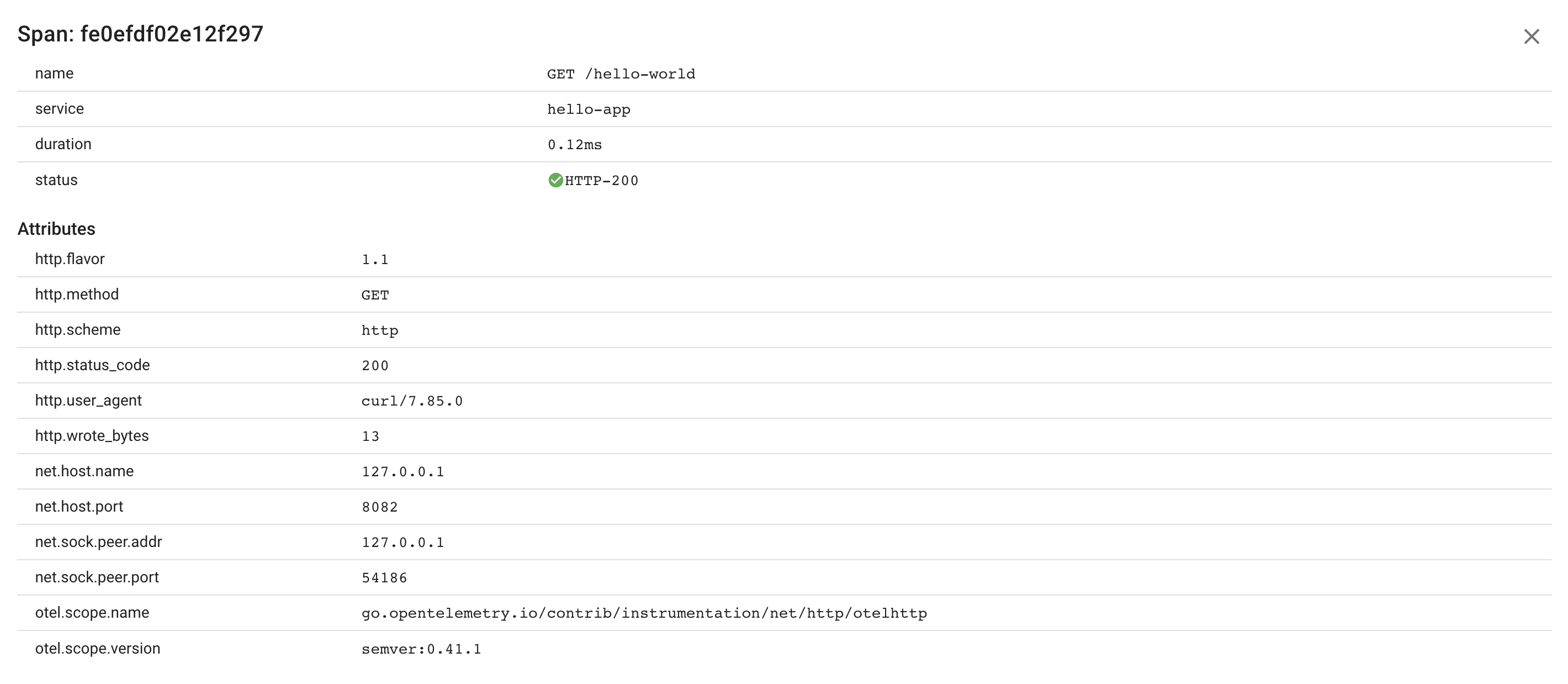
Step 1: add OpenTelemetry dependencies
$ go get \
go.opentelemetry.io/otel/exporters/otlp/otlptrace/otlptracehttp \
go.opentelemetry.io/contrib/instrumentation/github.com/gorilla/mux/otelmux github.com/gorilla/mux
Step 2: initialize OpenTelemetry and instrument the request router
The following example demonstrates how to instrument the Gorilla HTTP router with OpenTelemetry and export traces to an OpenTelemetry Collector through HTTP. The collector's endpoint and service name can be configured using environment variables.
package main
import (
"context"
"fmt"
"github.com/gorilla/mux"
"go.opentelemetry.io/contrib/instrumentation/github.com/gorilla/mux/otelmux"
"go.opentelemetry.io/otel"
"go.opentelemetry.io/otel/exporters/otlp/otlptrace"
"go.opentelemetry.io/otel/exporters/otlp/otlptrace/otlptracehttp"
"go.opentelemetry.io/otel/propagation"
"go.opentelemetry.io/otel/sdk/resource"
sdktrace "go.opentelemetry.io/otel/sdk/trace"
"log"
"net/http"
"os"
)
func initTracer() {
ctx := context.Background()
client := otlptracehttp.NewClient()
exporter, err := otlptrace.New(ctx, client)
if err != nil {
log.Fatalf("failed to initialize exporter: %e", err)
}
res, err := resource.New(ctx)
if err != nil {
log.Fatalf("failed to initialize resource: %e", err)
}
// Create the trace provider
tp := sdktrace.NewTracerProvider(
sdktrace.WithBatcher(exporter),
sdktrace.WithResource(res),
)
// Set the global trace provider
otel.SetTracerProvider(tp)
// Set the propagator
propagator := propagation.NewCompositeTextMapPropagator(propagation.TraceContext{}, propagation.Baggage{})
otel.SetTextMapPropagator(propagator)
}
func helloHandler(w http.ResponseWriter, r *http.Request) {
vars := mux.Vars(r)
fmt.Fprintf(w, "Hello, %s!", vars["name"])
}
func main() {
initTracer()
router := mux.NewRouter()
router.Handle("/hello/{name}", http.HandlerFunc(helloHandler))
// Initialize the instrumentation middleware
router.Use(otelmux.Middleware(os.Getenv("OTEL_SERVICE_NAME"}}
log.Fatalln(http.ListenAndServe(":8082", router))
}
Step 3: configuring OpenTelemetry using environment variables and run the app
Follow the OpenTelemetry documentation to learn the full list of available SDK and Exporter variables.
export \
OTEL_SERVICE_NAME="hello-app" \
OTEL_EXPORTER_OTLP_TRACES_ENDPOINT="http://coroot.coroot:8080/v1/traces" \
&& go run main.go
Step 4: validating
As a result, our app reports traces containing only a server span:

Span attributes:
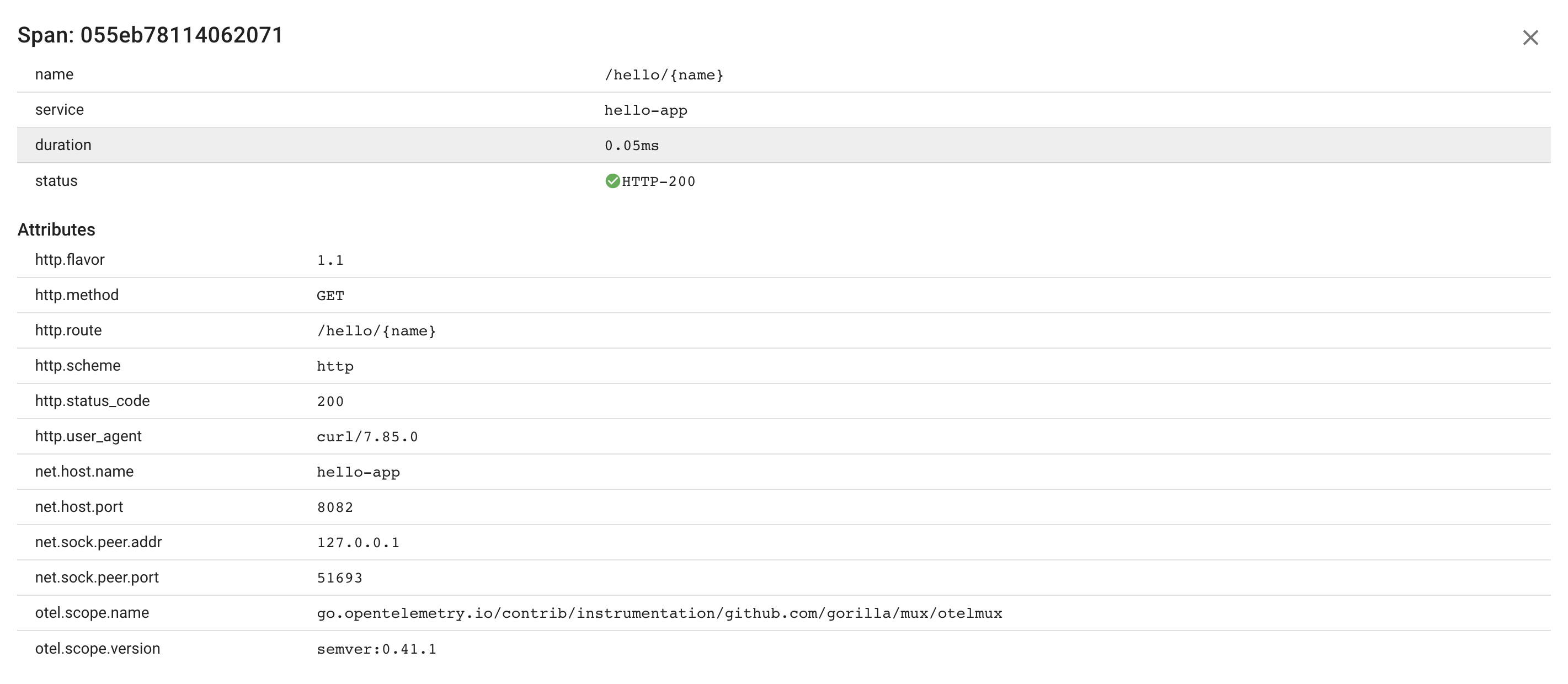
Step 1: add OpenTelemetry dependencies
$ go get \
go.opentelemetry.io/otel/exporters/otlp/otlptrace/otlptracehttp \
go.opentelemetry.io/contrib/instrumentation/github.com/labstack/echo/otelecho
Step 2: initialize OpenTelemetry and instrument the request router
The following example demonstrates how to instrument the Echo web framework with OpenTelemetry and export traces to an OpenTelemetry Collector through HTTP. The collector's endpoint and service name can be configured using environment variables.
package main
import (
"context"
"fmt"
"github.com/labstack/echo/v4"
"go.opentelemetry.io/contrib/instrumentation/github.com/labstack/echo/otelecho"
"go.opentelemetry.io/otel"
"go.opentelemetry.io/otel/exporters/otlp/otlptrace"
"go.opentelemetry.io/otel/exporters/otlp/otlptrace/otlptracehttp"
"go.opentelemetry.io/otel/propagation"
"go.opentelemetry.io/otel/sdk/resource"
sdktrace "go.opentelemetry.io/otel/sdk/trace"
"log"
"net/http"
"os"
)
func initTracer() {
ctx := context.Background()
client := otlptracehttp.NewClient()
exporter, err := otlptrace.New(ctx, client)
if err != nil {
log.Fatalf("failed to initialize exporter: %e", err)
}
res, err := resource.New(ctx)
if err != nil {
log.Fatalf("failed to initialize resource: %e", err)
}
// Create the trace provider
tp := sdktrace.NewTracerProvider(
sdktrace.WithBatcher(exporter),
sdktrace.WithResource(res),
)
// Set the global trace provider
otel.SetTracerProvider(tp)
// Set the propagator
propagator := propagation.NewCompositeTextMapPropagator(propagation.TraceContext{}, propagation.Baggage{})
otel.SetTextMapPropagator(propagator)
}
func main() {
initTracer()
e := echo.New()
// Initialize the instrumentation middleware
e.Use(otelecho.Middleware(os.Getenv("OTEL_SERVICE_NAME"}}
e.GET("/hello/:name", func(c echo.Context) error {
return c.String(http.StatusOK, fmt.Sprintf("Hello, %s!", c.Param("name")))
})
e.Logger.Fatal(e.Start(":8082"))
}
Step 3: configuring OpenTelemetry using environment variables and run the app
Follow the OpenTelemetry documentation to learn the full list of available SDK and Exporter variables.
export \
OTEL_SERVICE_NAME="hello-app" \
OTEL_EXPORTER_OTLP_TRACES_ENDPOINT="http://coroot.coroot:8080/v1/traces" \
&& go run main.go
Step 4: validating
As a result, our app reports traces containing only a server span:

Span attributes:
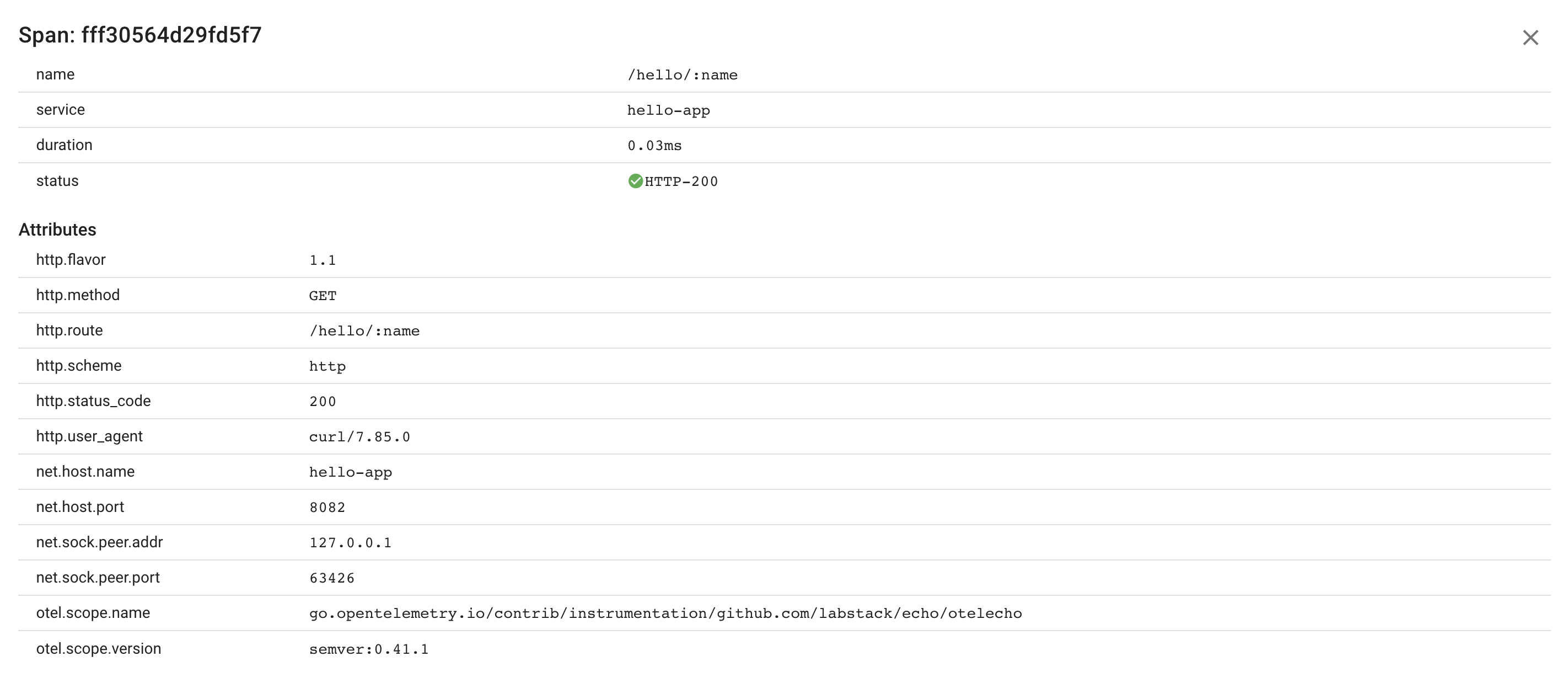
Step 1: add OpenTelemetry dependencies
$ go get \
go.opentelemetry.io/otel/exporters/otlp/otlptrace/otlptracehttp \
go.opentelemetry.io/contrib/instrumentation/github.com/gin-gonic/gin/otelgin
Step 2: initialize OpenTelemetry and instrument the request router
The following example demonstrates how to instrument the Gin web framework with OpenTelemetry and export traces to an OpenTelemetry Collector through HTTP. The collector's endpoint and service name can be configured using environment variables.
package main
import (
"context"
"github.com/gin-gonic/gin"
"go.opentelemetry.io/contrib/instrumentation/github.com/gin-gonic/gin/otelgin"
"go.opentelemetry.io/otel"
"go.opentelemetry.io/otel/exporters/otlp/otlptrace"
"go.opentelemetry.io/otel/exporters/otlp/otlptrace/otlptracehttp"
"go.opentelemetry.io/otel/propagation"
"go.opentelemetry.io/otel/sdk/resource"
sdktrace "go.opentelemetry.io/otel/sdk/trace"
"log"
"net/http"
"os"
)
func initTracer() {
ctx := context.Background()
client := otlptracehttp.NewClient()
exporter, err := otlptrace.New(ctx, client)
if err != nil {
log.Fatalf("failed to initialize exporter: %e", err)
}
res, err := resource.New(ctx)
if err != nil {
log.Fatalf("failed to initialize resource: %e", err)
}
// Create the trace provider
tp := sdktrace.NewTracerProvider(
sdktrace.WithBatcher(exporter),
sdktrace.WithResource(res),
)
// Set the global trace provider
otel.SetTracerProvider(tp)
// Set the propagator
propagator := propagation.NewCompositeTextMapPropagator(propagation.TraceContext{}, propagation.Baggage{})
otel.SetTextMapPropagator(propagator)
}
func main() {
initTracer()
r := gin.Default()
// Initialize the instrumentation middleware
r.Use(otelgin.Middleware(os.Getenv("OTEL_SERVICE_NAME"}}
r.GET("/hello/:name", func(c *gin.Context) {
name := c.Param("name")
c.String(http.StatusOK, "Hello, %s!", name)
})
log.Fatalln(r.Run(":8082"))
}
Step 3: configuring OpenTelemetry using environment variables and run the app
Follow the OpenTelemetry documentation to learn the full list of available SDK and Exporter variables.
export \
OTEL_SERVICE_NAME="hello-app" \
OTEL_EXPORTER_OTLP_TRACES_ENDPOINT="http://coroot.coroot:8080/v1/traces" \
&& go run main.go
Step 4: validating
As a result, our app reports traces containing only a server span:

Span attributes:

Adding custom attributes to spans
To add custom attributes to a span while processing a particular request, you can retrieve the span from the request context. This allows you to add contextual information that can help with understanding and debugging the request.
- http.Handler
- Echo Web Framework
- Gin Web Framework
func helloHandler(w http.ResponseWriter, r *http.Request) {
vars := mux.Vars(r)
name := vars["name"]
// get the current span by the request context
currentSpan := trace.SpanFromContext(r.Context())
currentSpan.SetAttributes(attribute.String("hello.name", name))
fmt.Fprintf(w, "Hello, %s!", name)
}
e.GET("/hello/:name", func(c echo.Context) error {
name := c.Param("name")
// get the current span by the request context
currentSpan := trace.SpanFromContext(c.Request().Context())
currentSpan.SetAttributes(attribute.String("hello.name", name))
return c.String(http.StatusOK, fmt.Sprintf("Hello, %s!", name))
})
r.GET("/hello/:name", func(c *gin.Context) {
name := c.Param("name")
// get the current span by the request context
currentSpan := trace.SpanFromContext(c.Request.Context())
currentSpan.SetAttributes(attribute.String("hello.name", name))
c.String(http.StatusOK, "Hello, %s!", name)
})
Instrumenting http.Client
If your application makes calls to other services or public HTTP APIs, you can instrument those calls using the otelhttp HTTP client wrapper.
- http.Get
- Manual Request Creation
func handler(w http.ResponseWriter, r *http.Request) {
// using the initial request context to propagate the relevant trace context to nested spans
resp, err := otelhttp.Get(r.Context(), "https://www.google.com")
...
}
func handler(w http.ResponseWriter, r *http.Request) {
// using the initial request context to propagate the relevant trace context to nested spans
req, err := http.NewRequestWithContext(r.Context(), "GET", "https://www.google.com", nil)
if err != nil {
...
}
req.Header.Set("X-Header", "value")
resp, err := otelhttp.DefaultClient.Do(req)
...
}
Traces now include not only a server span but also a client span that provides details of the outbound HTTP call.

Client span attributes:

Instrumenting SQL queries
To instrument SQL queries with OpenTelemetry in Golang, you can use the otelsql package. Here's an example of how to use it:
import (
"database/sql"
_ "github.com/lib/pq"
"github.com/uptrace/opentelemetry-go-extra/otelsql"
...
)
var db *sql.DB
func main() {
...
// Instrument `sql.DB` with the `otelsql` wrapper
db, err = otelsql.Open("postgres", connStr, otelsql.WithAttributes(semconv.DBSystemPostgreSQL))
...
}
func handler(w http.ResponseWriter, r *http.Request) {
...
// context propagation using r.Context()
rows, err := db.QueryContext(r.Context(), "SELECT * FROM products WHERE brand=$1", brand)
...
}
Client span attributes:

GORM
GORM is a popular open-source Object-Relational Mapping (ORM) library for Go. It provides a convenient way to interact with databases by abstracting away the low-level details of SQL queries and allowing developers to work with higher-level objects and methods.
To instrument the underlying SQL queries with OpenTelemetry, you can use the otelgorm package:
import (
"github.com/uptrace/opentelemetry-go-extra/otelgorm"
"gorm.io/gorm"
...
)
var db *gorm.DB
func main() {
...
db, err := gorm.Open(postgres.Open(connStr))
...
// Add the instrumentation
err = db.Use(otelgorm.NewPlugin())
...
}
func handler(w http.ResponseWriter, r *http.Request) {
...
// context propagation using r.Context()
err := db.WithContext(r.Context()).Where("brand = ?", brand).Find(&products).Error
...
}
Client span attributes:

Redis client
go-redis provides a hook that instruments Redis calls with OpenTelemetry.
import (
"github.com/go-redis/redis/extra/redisotel/v8"
...
)
var db *redis.Client
func main() {
db = redis.NewClient(&redis.Options{Addr: "127.0.0.1:6379"})
// Initialize the instrumentation hook
db.AddHook(redisotel.NewTracingHook())
...
}
func handler(w http.ResponseWriter, r *http.Request) {
// context propagation using r.Context()
cmd := db.SAdd(r.Context(), cartId, productId)
if cmd.Err() != nil {
...
}
}
Client span attributes:

Memcached client
You can instrument Memcached calls by creating an instrumented Memcached client that wraps a regular Memcached client with otelmemcache.
import (
"go.opentelemetry.io/contrib/instrumentation/github.com/bradfitz/gomemcache/memcache/otelmemcache"
...
)
var cache *otelmemcache.Client
func main() {
// Initialize the instrumented client
cache = otelmemcache.NewClientWithTracing(memcache.New("127.0.0.1:11211"))
...
}
func handler(w http.ResponseWriter, r *http.Request) {
// context propagation using r.Context()
item, err := cache.WithContext(r.Context()).Get(sessionId)
...
}
Client span attributes:

MongoDB client
import (
"go.mongodb.org/mongo-driver/mongo"
"go.mongodb.org/mongo-driver/mongo/options"
"go.opentelemetry.io/contrib/instrumentation/go.mongodb.org/mongo-driver/mongo/otelmongo"
...
)
var db *mongo.Client
func main() {
...
opts := options.Client()
opts.ApplyURI("mongodb://127.0.0.1:27017")
// Add the instrumentation to the client
opts.Monitor = otelmongo.NewMonitor()
db, err = mongo.Connect(ctx, opts)
...
}
func handler(w http.ResponseWriter, r *http.Request) {
...
collection := db.Database("orders").Collection("orders")
// context propagation using r.Context()
_, err = collection.InsertOne(r.Context(), bson.D{
{"user_id", userId},
{"products", productIds},
{"total", total},
{"Address", user.Address},
})
...
}
Client span attributes:
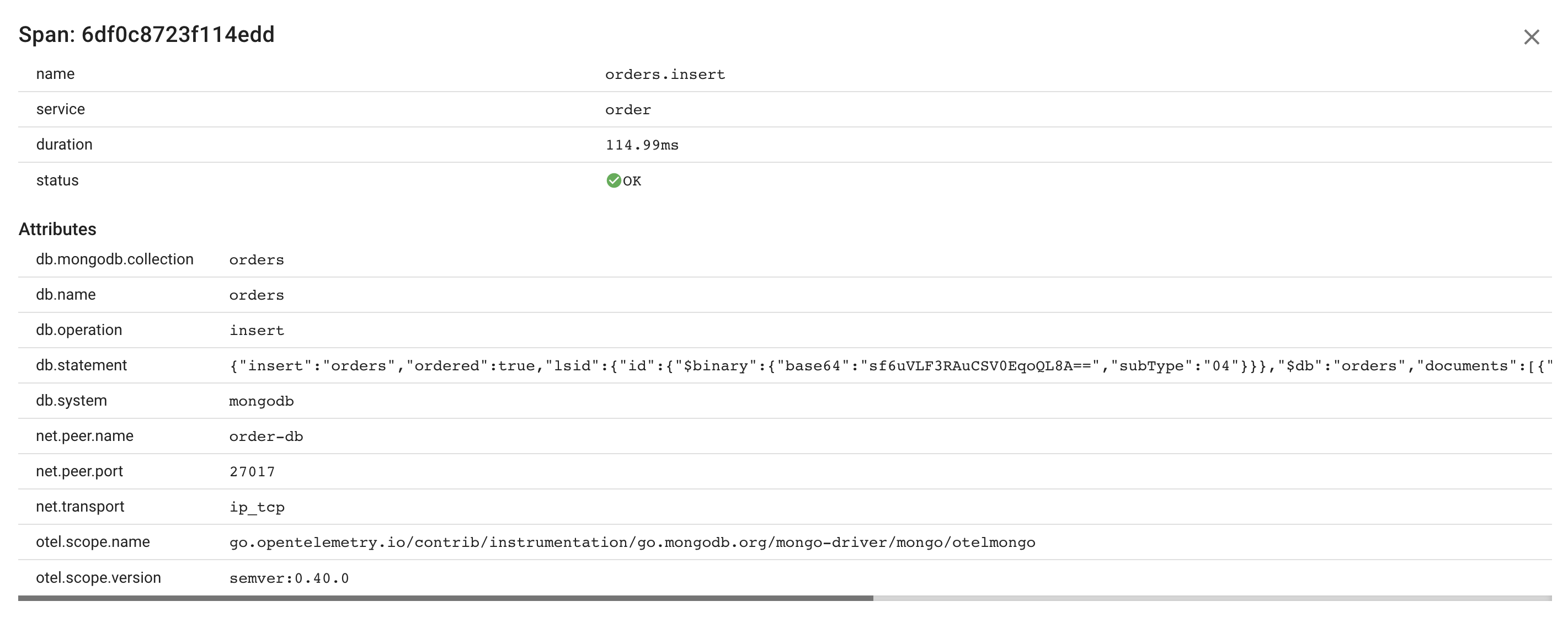
Cassandra client
import (
"github.com/gocql/gocql"
"go.opentelemetry.io/contrib/instrumentation/github.com/gocql/gocql/otelgocql"
...
)
var db *gocql.Session
func main() {
...
cluster := gocql.NewCluster("127.0.0.1:9042")
db, err = cluster.CreateSession()
...
// Add the instrumentation to the client
db, err = otelgocql.NewSessionWithTracing(context.Background(), cluster)
...
}
func handler(w http.ResponseWriter, r *http.Request) {
...
// context propagation using r.Context()
err := db.
Query(`INSERT INTO log (email, ts, event) VALUES (?, ?, ?)`, email, now, "login").
WithContext(r.Context()).
Exec()
...
}
Client span attributes:
